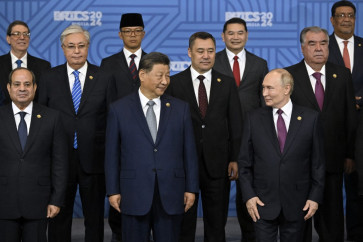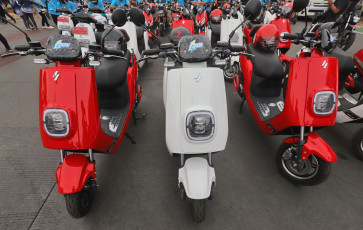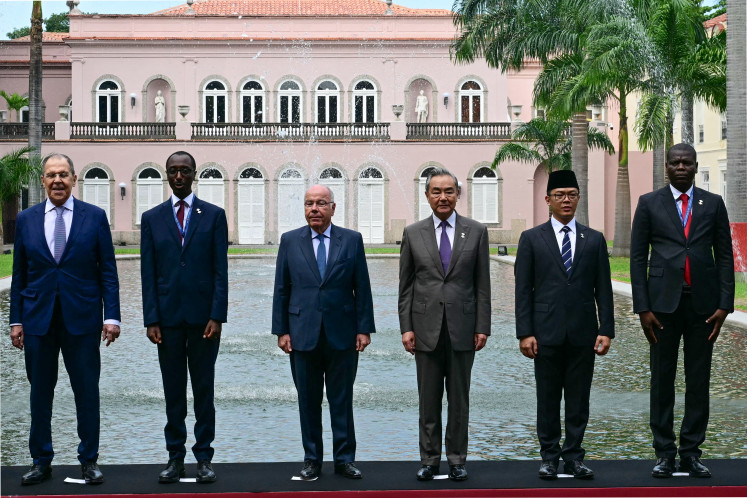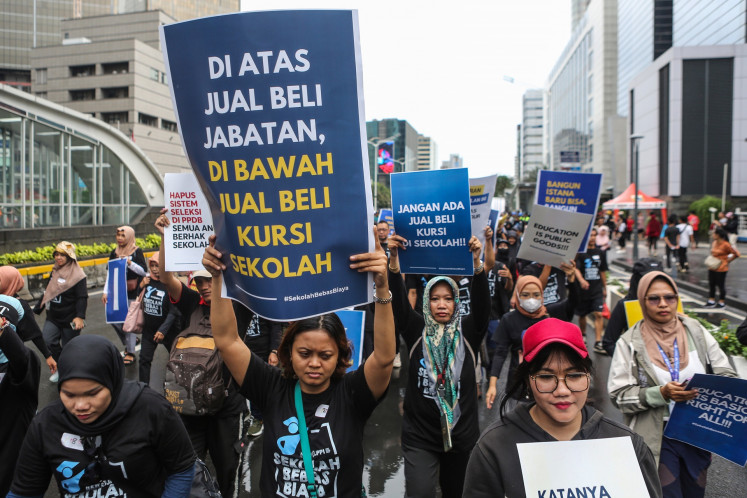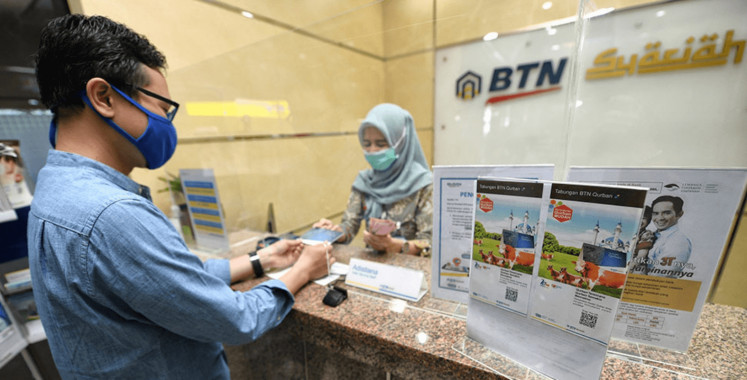Des Alwi: The uncrowned king of Banda
Pak Des Alwi used to be nick-named the “uncrowned king of the Banda Islands”
Change text size
Gift Premium Articles
to Anyone

P
ak Des Alwi used to be nick-named the “uncrowned king of the Banda Islands”. Although he was not a king, Pak Des deserves to be honored or “crowned” for all the good things he did to make a name for his small home archipelago in the world.
Pak Des spared no effort to always promote the islands where he was born, and thereby substantially
contributed to its position as an historically significant destination, where, among others, famous Indonesian leaders like Mohammad Hatta and Sutan Sjahrir had been exiled by the Dutch. Pak Des also helped restore various important sites on his islands, financially contributing a lot from his own resources.
Many famous people have visited Pak Des Alwi in Banda, as becomes clear from the picture gallery gracing the walls of his charmingly located hotel there, including Prince Bernard of the Netherlands, Princess Diana and underwater pioneer Jacques Cousteau.
Pak Des was well-known for his documentary films, including those on the Banda Islands.
He liked to be active as a camera man himself and exclusively recorded the eruption of the Banda Gunung Api volcano in 1988. He wrote various interesting books on the history of Moluccas, Banda in particular, both in Indonesian and English. His last book deals with his childhood memoirs, titled A boy from Banda: A spice island childhood, published by his Banda Naira Culture and Heritage Foundation. I found it fascinating to read during my farewell journey to Banda last summer.
I had the honor to visit the Banda Islands together with Om Des three times, always travelling via Ambon, where we were kindly received by Governor Karel Rahalalu to discuss bilateral issues. The first visit was an acquaintance visit to get to know more about the Dutch colonial past. Together we flew to Banda Naira Airport in a small plane just big enough to land there on the short landing strip (weather circumstances permitting).
We were kindly received by the local notables and other friendly Bandanese people, including young dancers who, under the sound of traditional Bandanese music, presented us with the famous Banda nutmeg and mace, placed in a bamboo nutmeg harvest instrument. From the airport we drove to the hotel of Pak Des Alwi, escorted by one voorijder with sirens on an island with no more than a handful of cars.
All had been minutiously prepared by Pak Des.
Together we visited all the islands, including Run, which was exchanged in 1667 by the Dutch against Manhattan (New Amsterdam), to regain the monopoly over the nutmeg spice trade, which had been undermined by the British.
Near the Ai Island, we were welcomed by some 35 impressive kora-kora rowers who energetically moved their long boat with great speed in front of us. During the journeys Pak Des gave us extensive lectures on the history of Banda, about his school days with Hatta and Sjahrir and about Dutch colonial times. When speaking, he alternated between Indonesian, English and perfect Dutch.
In the meantime we witnessed the exciting view of a group of some hundred dolphins and got a 32-kilogram heavy yellow-finned tuna fish, which costs a fortune in Japanese restaurants.
We consumed part of it raw on the spot in the boat of Pak Des, adding to it some soya sauce and horseradish, which he had taken especially for the occasion, keeping the rest for the evening.
Pak Des was always steering his motor boat by himself, being not only the captain in command of his ship, but also of his beloved Banda Islands. He was a kind of friendly and benevolent godfather to this small archipelago, many people seeking his advice, support and help.
Usually we would go snorkeling at the northern shore of the Gunung Api volcanic island, at the foot of which water was still pleasantly warm, even after more than 20 years since the 1988 eruption.
His daughter Tanya joined us on such occasions. Pak Des showed us the rich underwater world there, which, unexpectedly, had fully recovered, irrespective of the hot volcanic lava flows which at first had brutally destroyed all local underwater life. He also introduced us to the very rare sight of the blue-green-red mandarin fish in front of his hotel.
On Banda Besar Island, Pak Des energetically reactivated the traditional nutmeg cultivation, which, apparently, is the best in Banda due to its extraordinary natural circumstances: volcanic soil, close to the ocean, fresh sea wind and clean air.
After having climbed the Gunung Api (Mt. Api) myself, I was given a document mentioning my honorary citizenship of the Banda Archipelago, signed by Om Des personally, as he gave to other travelers who had succeeded in undertaking this exhausting mountain climbing on foot. It was a sympathetic way of promoting travel to this extraordinary part of the world.
The second visit to Banda was on the occasion of the four centuries’ commemoration of the bloodbath carried out by the Dutch governor Gen. Jan Pieterszoon Coen, during which the Banda elite was decimated, and many other people from Banda were killed. This development clearly constitutes a black page in Dutch colonial history.
A few minutes before landing at Banda Naira, Pak Des informed me that I was expected to deliver an official speech on this occasion, which I delivered to the best of my abilities, and which was apparently well received by the local population and others present.
We made this journey together with former ambassador Sabam Siagian, ambassador Ashok Mirpuri of Singapore, the US Charge d’Affaires, well-known members of the families of Mr. Sutan Sjahrir and Mr. Mohammad Hatta, and others. It was an impressive journey during which Pak Des as usual was our good guide and history teacher.
We all attended the yearly held kora-kora rowing contests which were organized between crews from all Banda islands, except Run (which has no team) and could bet on the prospective winners. Due to rainfall our plane could not land in Banda, as a result of which we had to delay our return journey by one day. Pak Des, with his good humor, as always, took care that our prolonged stay on his island was only a pleasure.
My third visit was a farewell visit, during which I had the honor to inaugurate together with Pak Des the Perkeniershuis “Spantje By” on the island of Banda Besar. Spantje By was once a prominent symbol of the nutmeg cultivation there.
On our way to the island we were once more escorted by kora-kora war boats, waving the Dutch Orange flag below the Indonesian Red-White. I was impressed by this hospitable gesture, which I would not have expected, taking the Dutch bloody colonial history into account.
This occasion constituted another example of how the Indonesian people are a forward looking nation, capable of forgiveness whilst being fully aware of history. Pak Des was a good example of such a tolerant and forward looking people.
It was one of the most impressive and beautiful journeys we made, thanks to Pak Des, who accompanied us by boat, steering as usual, but looking a little more tired than on earlier occasions.
Perhaps this had also to do with his energetic preparations for the great Banda Sail event that was to take place that summer. Pak Des always kept his strong and good spirit, as well as good humor.
At home in Jakarta, I was reminded almost every day of the Banda Islands during breakfast, because Pak Des regularly presented me with nutmeg marmalade (selai buah pala), which he personally took
with him to Jakarta after every visit to Banda.
One thing we can be sure of: The Banda Islands will never be the same without Pak Des Alwi.
The writer is former Royal Dutch ambassador to Indonesia (2005-2010).


